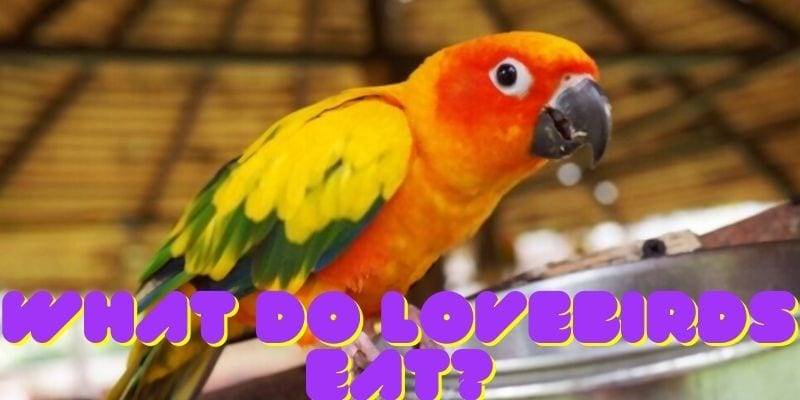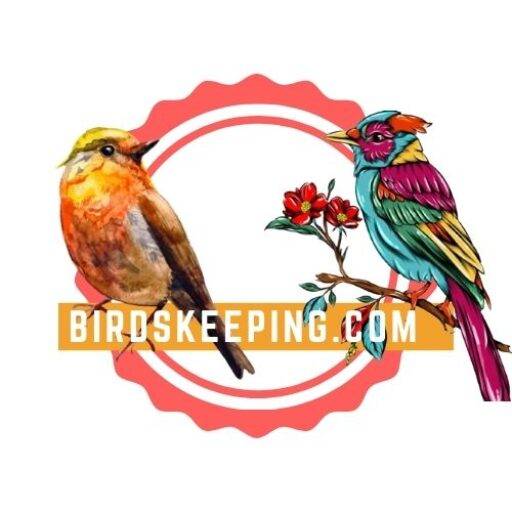Lovebirds eat a wide variety of things, but you should be specific if you want your lovebird to be healthy. But before feeding them food, we should have known the preferences about what do lovebirds eat & what to feed them.
The best food for lovebirds includes carrots, pellets, grains, lead buds, berries, sunflower, millet, chicory, zucchini, squash, corn, dark leafy greens, romaine, and maize. The detailed diet guide will help you to understand their eating habit.
But many people don’t get specific while feeding their lovebirds. They feed the human food to their bird or whatever they get from the store.
Table of Contents:
- What Do Lovebirds Eat in The Wild?
- Lovebirds Favorite Foods
- Best Foods For The Lovebirds
- What Can Lovebirds Drink?
- What Foods Can Lovebirds Not Eat?
- What Do Baby Lovebirds Eat?
- Best Seed Mix For Lovebirds
- Can Lovebirds Eat Watermelon?
- Can Lovebirds Eat Corn?
- Final Lines
What Do Lovebirds Eat in The Wild?
Lovebird’s food category in the wild depends from place to place. It depends on what kind of things grow in the forest where a lovebird lives.

Usually, lovebirds get seeds, berries, fruits, nuts, grasses, leaf buds, agricultural corn, maize, and figs to eat in the wild.
Some species are known to prey on farmers’ crops considered pests in their natural habitat. A single lovebird’s diet can contain 40 to 50 grams of food.
What Do Baby Lovebirds Eat? (Suitable Foods & Hand Feeding Tips)
Lovebirds Favorite Foods
Like many creatures and especially birds, lovebirds also have choices when it comes to eating habits. Lovebird’s favorite food list includes some fruits and vegetables listed below.
Favorite Fruits Of Lovebirds
There are several fruits that lovebirds love to eat, and these fruits are the favorite food of lovebirds. They quickly get attracted to the fruits that they like to have. Fruits that lovebirds love to eat are given below.
- Apples
- Oranges
- Berries
- Bananas
- Papaya
- Mango
- Grapes
Favorite Vegetables Of Lovebirds
Vegetables are also considered the favorite food of lovebirds. They need various nutrients for their growth and energy. Some vegetables that lovebirds love to eat are mentioned below.
- Leaf buds
- Carrot
- Zucchini
- Romaine
- Pellets
- Broccoli
- Legumes
Best Foods For The Lovebirds
Fruits, Seeds, and Vegetables are considered the best food for lovebirds. Fruits such as bananas are on the top list, and lovebirds eat them in large quantities.
Most fruits, like bananas, are very healthy for your lovebird to consume, and there are many advantages banana brings to the lovebird’s health.
If you feed your lovebird pellets, berries, and grains, then it is a perfect way to add variety to their diet, and if you feed them in your hand, then in this way, your bird will start loving you. It allows you to interact with them.
Sunflower seed is also the best food to feed your lovebird. It attracts a wide range of birds and is often used in backyard bird feeders. On the other hand, fruits like strawberries, berries, papaya, mango, and grapes are the easiest and healthiest foods for lovebirds.
Orange is also very healthy for birds. Although the peels of the oranges are a bit risky because they contain pesticides, it is preferable to cut the peels before feeding the oranges to your parrots.
Zucchini, cabbage, fried sweet potatoes, chicory, romaine, dandelion leaves, kale, broccoli, dark leafy greens and grasses, edible flowers, legumes, and leaf buds all are the best foods as vegetables for lovebirds.
What Can Lovebirds Drink?
In certain places, your lovebird can drink the well water. If you are keeping it as a pet, you should have it checked before giving your lovebird some well water.
The well water can contain high levels of iron and other minerals, which can damage the kidneys of a lovebird.
Fruit juice can be offered to your lovebird in moderation, but it shouldn’t make up a significant portion of their diet. Few birds are more susceptible to the acids present in orange juice and other acidic fruit juices.
The acid can cause inflammation in the intestines and even diarrhea. Diarrhea can be caused by one more thing which is milk.
Even though lactose, which is present in milk and other dairy products, is not technically poisonous, tests suggest that birds cannot absorb it. Birds can experience diarrhea as the amount of dairy in their diet increases.
Ultimately water is the best drink for lovebirds, and it does not harm your bird. But it may harm your lovebird if it is given in excess amount.
What Foods Can Lovebirds Not Eat?
Many foods have to be kept away from your lovebirds because they may be harmful to your lovebird.
01. An avocado must not be given to the lovebird. The avocado plant’s leaves contain a fatty acid-like compound that destroys fungi on the plant.
2. Caffeine can also be very harmful because it can induce heart disturbance, hyperactivity, and even cardiac arrest.
3. Salty meats, chips, and other animal foods that contain salt for nutritional benefit should not be offered to birds.
4. This delicious Garlic, which is considered safe for people’s hearts, is a well-known contaminant in dogs and cats and has resulted in the deaths of geese and other pet birds, so keep it away from your lovebird. Garlic contains a compound that can cause anemia in birds in rare cases.
5. Lovebirds should never be given to consume the seeds and pits of such fruits with seeds (like apples and pears) and pits (like cherries, apricots, peaches, nectarines, and plums) because they contain tiny quantities of cardio-toxic cyanide.
6. Fried, fresh, or dehydrated onions contain sulfur compounds that, when chewed, can cause red blood cell rupture, resulting in anemia (an inadequate quantity of red blood cells). Onions can also irritate a bird’s throat, small intestine, and seed, causing ulcers.
7. On the other hand, chocolate can cause nausea and vomiting in birds. Much worst, chocolate contains both nicotine and flavonoids, which can cause impulsivity, tremors, and epilepsy, as well as death in birds.
8. Xylitol is a sugar alcohol. This artificial sweetener, which can be used in sugar-free candy and many diet foods, hasn’t been thoroughly tested in birds.
It has been shown to cause severe hyperglycemia, liver injury, and death in dogs. To keep calorie intake, overweight birds should consume low-starch vegetables.
What Do Baby Lovebirds Eat?
The baby lovebirds require more care and concentration. We have to look after them as we look after the kids. Baby birds can eat specific foods, and they are not able to eat different types of foods.
Three to five times feedings (every five hours) are needed until the eyes open, and when the feathers begin to develop, feed them 2 to 3 times a day (every 6 hours).
When done, the crop should appear whole. It is unnecessary to feed them during the sleeping time between the hours of (10:00 pm to 6:00 am).
Freshwater, nutritious items such as lettuce, grains, banana, and crushed eggshells should be given to baby lovebirds. Likely, a female lovebird won’t adequately feed the chick in certain situations.
They would also start investigating the bird feeder or whatever container they are housed in at this period and practicing flight.
During this exploratory process, their mother will begin weaning them, and after around eight weeks, they should be completely weaned and fed on their own.
Then you have to keep the food and water in the cage of your lovebird, and the food must be fresh.
Best Seed Mix For Lovebirds
Based on specific research, the best seed mix for lovebirds include Sunflower, Peanuts, Corn, Black oil, Striped oil, Nyjer, Thistle, Sorghum, Flax, Soaked Sultanas, Raisins, Currants, Black Sunflower Seeds, Pinhead Oatmeal, White proso millet, Shelled and cracked corn.
But Geis recommends that backyard lovebird watchers use 100% sunflower seed in their feeders to get the most birds for their money.
However, they admit that scattering white proso millet on the ground or in a platform feeder will attract various ground-eating birds.
The excess amount of seeds can be harmful to the bird because seeds are rich in fat and deficient in many other nutrients, including amino acids, vitamins, and minerals.
While bird lovers can easily supplement wild birds with feeders full of seed, too much seed for your pet bird can cause serious problems.
Can Lovebirds Eat Watermelon?
Yes, there is no doubt! Watermelon is one of the safest fruits for lovebirds to eat. However, it is also a good idea to cut the seeds and soak them overnight. So they become moist and easy to eat for your lovebird.
When combined with other fruits and vegetables, watermelon adds nutritional benefits to your lovebird. They improve your lovebird’s immunity and fitness, as well as their activity level.
Watermelons are high in fiber, which is beneficial to your lovebird’s digestive system. Your lovebirds get a lot of vitamins, nutrients, enzymes, and a small number of calories.
Watermelon seeds are a preferred snack for birds. It is advised that you soak this for them overnight so that your lovebird can easily eat it. One more thing, make sure that the rind of the watermelon is removed so they don’t come into contact with pesticides.
It would be best to cut the watermelon into tiny bits to deal with their mess when eating it. Chopping reduces the surface area and makes it easier for them to eat.
Can Lovebirds Eat Corn?
Corn is almost as safe for lovebirds as it is for humans. Many ground-feeding species, such as doves and native sparrows, eat cracked corn. Ducks, geese, jays, crows, and cranes prefer whole kernels. So feel free to feed corn to your lovebird.
You can use the screen button on platform feeders, and tray feeders are placed only above ground level for drainage.
Corn spoils quickly, and one kind of bacteria that thrives on corn creates a toxic toxin, so give your birds as much as they’ll eat in a day. If corn becomes moldy, it can be discarded or composted out of reach of birds.
Cracked corn can be a favorite food of lovebirds, making it an ideal addition to many birds’ food.
Birders may use cracked corn to save money on birdseed by restricting pricier choices at the feeders if given to provide giant birds with larger appetites. Then it is a less costly meal. So cracked corn is healthy as well as less expensive food for your lovebird.
Final Lines
Lovebirds are not selective when it comes to their eating behavior. But there are several foods that lovebirds cannot consume, and many pet owners, including birdwatchers, have asked what to feed lovebirds.
Most lovebirds satisfy their hunger with various fruits and vegetables, including apples, bananas, lettuce, carrots, etc. All the favorite foods of lovebirds are also briefly discussed above.
Birdskeeping is supported by its readers. When you purchase through links on our site, we may earn an affiliate commission. Also, as an Amazon affiliate, we earn from qualifying purchases without costing you extra.
